Ve Cut Off Your Chonson, by Visual Etiquette. Courtesy of Visual Etiquette
This Here Story Im about to Unfold
 first saw The Big Lebowski upon its 1998 release in a moderately full movie theater in a Portland, Oregon, mall. I left the theater both confused and exhilarated, as well as a little wobblyupon initial viewing, Lebowskis sensibility can leave you feeling off-kilter.
first saw The Big Lebowski upon its 1998 release in a moderately full movie theater in a Portland, Oregon, mall. I left the theater both confused and exhilarated, as well as a little wobblyupon initial viewing, Lebowskis sensibility can leave you feeling off-kilter.
Its a movie that I have now seen countless times in a variety of settings: at White Russian parties and packed movie houses and alone in front of my TV (originally on VHS). Like the best literature and filmsfor me Faulkners The Sound and the Fury and Coppolas The GodfatherThe Big Lebowski changes, expands, and deepens with time. I initially found Walters constant yelling abrasive; now I consider his dialogue and Goodmans delivery of it to be the funniest and most interesting in the film. Each showing reveals a little something newa reference, a joke previously missed (because laughing drowns it out), a parody, a philosophy. Ill watch it and decide its about masculinity... no, friendship... no, language... no, just plain silliness... no, its a genre film that turns the genre on its head. Well, its all these things, and more.
This film, created by those sly, witty instigators who come from my home state of Minnesota, had a muted opening that has become a groundswell. Timed for the fifteenth anniversary of the movie, The Big Lebowski: An Illustrated, Annotated History of the Greatest Cult Film of All Time is a celebration of all things Lebowski: the high and the low of a film that is now among the elite in the pop-culture canon.
Jenny M. Jones, St. Paul, 2012

PROLOGUE
What Makes a Man? Achieving vs. Abiding

 t the conclusion of The Big Lebowski, the films narrator, the Stranger, says he takes comfort in the fact that the Dude abidesthat is, he endures without yielding. That the Dude abides, which is the nature of his character, spirit, makeupor to quote the Coen brothers Raising Arizona, his goddamn raison detreis at the crux of the film. Its a loving characterization, that of the Coens Dude, and this consummate ability to simply abide may be why this disheveled, foul-mouthed, paunchy layabout has become an inspiration to legions of people worldwide.
t the conclusion of The Big Lebowski, the films narrator, the Stranger, says he takes comfort in the fact that the Dude abidesthat is, he endures without yielding. That the Dude abides, which is the nature of his character, spirit, makeupor to quote the Coen brothers Raising Arizona, his goddamn raison detreis at the crux of the film. Its a loving characterization, that of the Coens Dude, and this consummate ability to simply abide may be why this disheveled, foul-mouthed, paunchy layabout has become an inspiration to legions of people worldwide.
Despite operating through a fog of creamy alcohol and reefer smoke, the Dude is no dummy. Off the cuff, he makes hilarious observational quips: to Bunny Lebowskis offer of a blowjob for a cool grand, he deadpans, Im just gonna go find a cash machine; he answers the Big Lebowskis question about what makes a man with a pair of testicles; and he jokes that he still jerks off manually to pornographer Jackie Treehorn. Even when under threat, he manages to tell the thugs holding his head in the toilet that the money theyre looking for must be down there somewhere. Let me take another look. He also has a fearless streakwhen the Big Lebowski refuses to compensate him for his rug, he goes right ahead and takes one for himself.

An army of Dudes, by Dax Norman.Courtesy of the artist, www.daxnorman.com
Lord save little children! The wind blows and the rains are cold. Yet, they abide.... They abide and they endure.
Rachel, in The Night of the Hunter (1955), a favorite of Joel and Ethan Coen
Even beyond his smarts and innate sense of humor, the Dude is eminently likeable, certainly to generations of young people living in post-1950s conservative America. The Dude values friendship and peace. He takes time to see his landlord Martys inept modern dance cycle in a near-empty theater, and shows as much patience as can be mustered with the blowhard Walter Sobchak, despite his friends very unpeaceful, militaristic view on life. Even when exasperated, he tells Walter he loves him. The Dude sympathizes with those he perceives to be weak or under threat. The rival bowler Smokey is fragile, with emotional problems; Bunnys life was in the Dudes hands, and he feels responsible that the kidnappers are going to kill that poor woman.
Not a workaholic by any stretch of the imagination, the Dude maintains a consistent Zen-like attitude; New Yorker critic David Denby characterized the film as a slacker hymn of praise. He is comfortable with who he is, and he takes life as it comes. While in many ways he is a figure from the pasthe defines himself by his 1960s and early 1970s political activism, antiestablishment leanings, and drug usehe isnt actually living in the past, as he berates the mercurial law-and-order nut Walter for doing. The Dude lives in the moment. He does not feel pressure to achieve. As Joel and Ethan Coen wrote when first describing the character in their script, His rumpled look and relaxed manner suggest a man in whom casualness runs deep. And at a time when young people with higher education cannot get more than entry-level jobsdespite which money, status, and achievement are still prized by American societythis astute and generally content character, who shrugs off such trappings, is refreshing, even restorative. As an article in Sidevue says, The Big Lebowski is casually radical in its joyful explosion of the myth of the American movie hero, a concept the Stranger seems to confirm when he opens the film with the drawled lines, I wont say a hee-ro, cause whats a hee-ro?
Theres a freedom to The Big Lebowski, said Philip Seymour Hoffman (who plays the sycophantic character Brandt) in Rolling Stone magazine. The Dude abides, and I think thats something people really yearn for, to be able to live their life like that. You can see why young people would enjoy that. In the wake of the film, this unique view on life has become a movementone that chooses abiding over achieving.


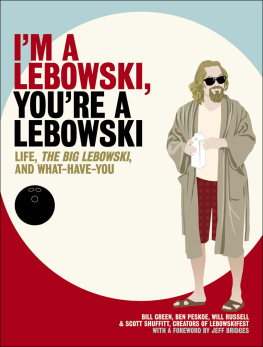
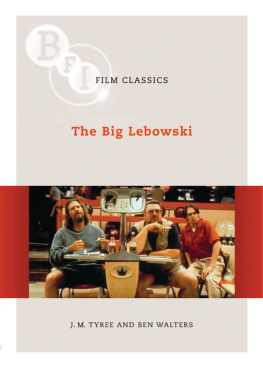
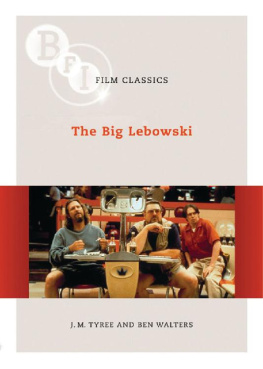
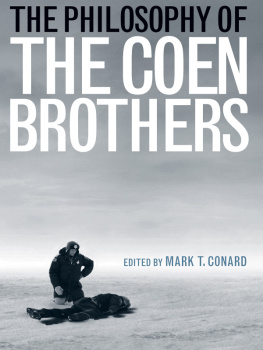
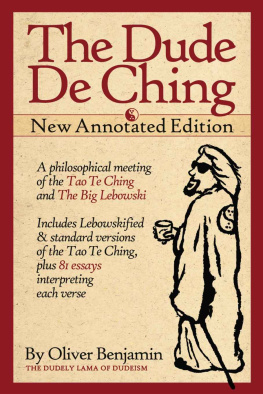
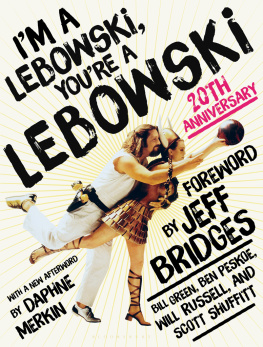
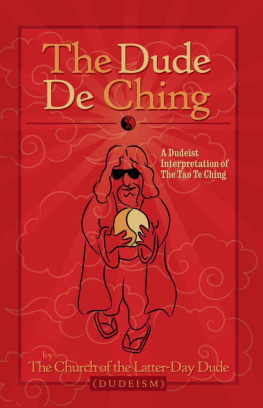







 first saw The Big Lebowski upon its 1998 release in a moderately full movie theater in a Portland, Oregon, mall. I left the theater both confused and exhilarated, as well as a little wobblyupon initial viewing, Lebowskis sensibility can leave you feeling off-kilter.
first saw The Big Lebowski upon its 1998 release in a moderately full movie theater in a Portland, Oregon, mall. I left the theater both confused and exhilarated, as well as a little wobblyupon initial viewing, Lebowskis sensibility can leave you feeling off-kilter.

 t the conclusion of The Big Lebowski, the films narrator, the Stranger, says he takes comfort in the fact that the Dude abidesthat is, he endures without yielding. That the Dude abides, which is the nature of his character, spirit, makeupor to quote the Coen brothers Raising Arizona, his goddamn raison detreis at the crux of the film. Its a loving characterization, that of the Coens Dude, and this consummate ability to simply abide may be why this disheveled, foul-mouthed, paunchy layabout has become an inspiration to legions of people worldwide.
t the conclusion of The Big Lebowski, the films narrator, the Stranger, says he takes comfort in the fact that the Dude abidesthat is, he endures without yielding. That the Dude abides, which is the nature of his character, spirit, makeupor to quote the Coen brothers Raising Arizona, his goddamn raison detreis at the crux of the film. Its a loving characterization, that of the Coens Dude, and this consummate ability to simply abide may be why this disheveled, foul-mouthed, paunchy layabout has become an inspiration to legions of people worldwide.